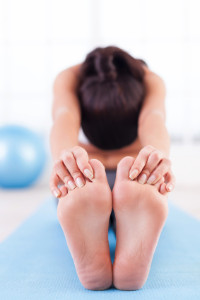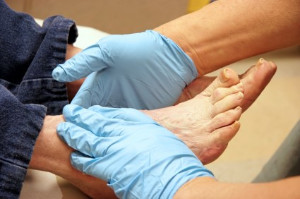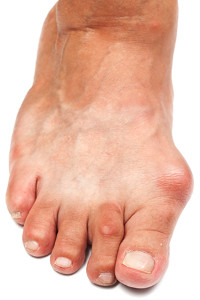Items filtered by date: September 2017
Exercises That Strengthen Your Feet
 Many people spend a lot of time exercising. Often, they wind up working out every part of their body but their feet. While it may not seem important, having strong feet improves balance and mobility, and promotes overall body health. The following are some exercises that can help increase foot strength, with the approval of your podiatrist. Flexed-toe raises can be completed by first standing on a slanted board while holding onto something. Then, bring your heels off the ground while standing on the balls of your feet for 12-16 repetitions. Lifting each of your toes up separately 10 times each will help increase flexibility. After that, point all of your toes up in the air and then curl them in; do 20 of these for each foot. Foot crunches, which are done by picking your foot up and contracting the toe joints and heel together for 10 seconds, should be done with each foot six times. Finally, while standing, shift your weight to your left and pull at the ground with your right toes by scrunching them to move forward. Do this 10 times before switching to the opposite leg.
Many people spend a lot of time exercising. Often, they wind up working out every part of their body but their feet. While it may not seem important, having strong feet improves balance and mobility, and promotes overall body health. The following are some exercises that can help increase foot strength, with the approval of your podiatrist. Flexed-toe raises can be completed by first standing on a slanted board while holding onto something. Then, bring your heels off the ground while standing on the balls of your feet for 12-16 repetitions. Lifting each of your toes up separately 10 times each will help increase flexibility. After that, point all of your toes up in the air and then curl them in; do 20 of these for each foot. Foot crunches, which are done by picking your foot up and contracting the toe joints and heel together for 10 seconds, should be done with each foot six times. Finally, while standing, shift your weight to your left and pull at the ground with your right toes by scrunching them to move forward. Do this 10 times before switching to the opposite leg.
Exercising your feet regularly with the proper foot wear is a great way to prevent injuries and build strength. If you have any concerns about your feet, contact one of our podiatrists from Pennsylvania. Our doctors can provide the care you need to keep you pain-free and on your feet.
Exercise for Your Feet
Exercise for your feet can help you gain strength, mobility and flexibility in your feet. They say that strengthening your feet can be just as rewarding as strengthening another part of the body. Your feet are very important, and we often forget about them in our daily tasks. But it is because of our feet that are we able to get going and do what we need to. For those of us fortunate enough to not have any foot problems, it is an important gesture to take care of them to ensure good health in the long run.
Some foot health exercises can include ankle pumps, tip-toeing, toe rises, lifting off the floor doing reps and sets, and flexing the toes. It is best to speak with Our doctors to determine an appropriate regimen for your needs. Everyone’s needs and bodies are different, and the activities required to maintain strength in the feet vary from individual to individual.
Once you get into a routine of doing regular exercise, you may notice a difference in your feet and how strong they may become.
If you have any questions please feel free to contact one of our offices located in Plymouth Meeting and Ambler, PA . We offer the newest diagnostic and treatment technologies for all your foot and ankle needs.
Diabetes and Foot Care
 While the relationship between diabetes and the feet may not seem important to most people, it is of utmost concern. Diabetics generally suffer from poor blood circulation and neuropathy, or nerve loss. Due to the loss of sensation associated with neuropathy, diabetics may not realize when they have a foot ulcer. The wound may also become infected due to the poor blood circulation and improper healing. Amputations are not uncommon because of diabetes, and awareness of this issue is vital to those who have the condition. Diabetics should inspect their feet daily for wounds, splinters, or any abnormalities. If you have diabetes, avoid going barefoot and wear well-cushioned footwear that provides optimal foot support and wiggle room for the toes. Finally, it is highly recommended to see a podiatrist for a foot examination at least once a year.
While the relationship between diabetes and the feet may not seem important to most people, it is of utmost concern. Diabetics generally suffer from poor blood circulation and neuropathy, or nerve loss. Due to the loss of sensation associated with neuropathy, diabetics may not realize when they have a foot ulcer. The wound may also become infected due to the poor blood circulation and improper healing. Amputations are not uncommon because of diabetes, and awareness of this issue is vital to those who have the condition. Diabetics should inspect their feet daily for wounds, splinters, or any abnormalities. If you have diabetes, avoid going barefoot and wear well-cushioned footwear that provides optimal foot support and wiggle room for the toes. Finally, it is highly recommended to see a podiatrist for a foot examination at least once a year.
Diabetic foot care is important in preventing foot ailments such as ulcers. If you are suffering from diabetes or have any other concerns about your feet, contact one of our podiatrists from Pennsylvania. Our doctors can provide the care you need to keep you pain-free and on your feet.
Diabetic Foot Care
Diabetes affects millions of people every year. The condition can damage blood vessels in many parts of the body, especially the feet. Because of this, taking care of your feet is essential if you have diabetes, and having a podiatrist help monitor your foot health is highly recommended.
The Importance of Caring for Your Feet
- Routinely inspect your feet for bruises or sores.
- Wear socks that fit your feet comfortably.
- Wear comfortable shoes that provide adequate support.
Patients with diabetes should have their doctor monitor their blood levels, as blood sugar levels play such a huge role in diabetic care. Monitoring these levels on a regular basis is highly advised.
It is always best to inform your healthcare professional of any concerns you may have regarding your feet, especially for diabetic patients. Early treatment and routine foot examinations are keys to maintaining proper health, especially because severe complications can arise if proper treatment is not applied.
If you have any questions please feel free to contact one of our offices located in Plymouth Meeting and Ambler, PA . We offer the newest diagnostic and treatment technologies for all your foot and ankle needs.
Picking Footwear for Women
 Choosing the right type of footwear for women can be difficult. High heels can exacerbate a number of foot-related issues such as bunions, plantar fasciitis, and ingrown toenails. Flats, on the other hand, don’t provide enough support for the foot. Knowing what to look for in a shoe can save you from a number of foot problems. Throughout the day, your feet tend to increase in size; with this in mind, it is recommended to buy shoes later in the day when the feet are largest. If a pair of shoes you want don’t offer arch support, try orthotic inserts to make them more comfortable and appropriate for your feet. Knowing what shoes to wear for specific occasions is important. Athletic shoes generally provide great comfort and support and are a good choice for everyday activities. When wearing high heels or flats, try not to wear them for more than two hours. Finally, make sure that the shoes you purchase aren’t too pointy for the toes. Shoes that allow the toes to wiggle around are recommended.
Choosing the right type of footwear for women can be difficult. High heels can exacerbate a number of foot-related issues such as bunions, plantar fasciitis, and ingrown toenails. Flats, on the other hand, don’t provide enough support for the foot. Knowing what to look for in a shoe can save you from a number of foot problems. Throughout the day, your feet tend to increase in size; with this in mind, it is recommended to buy shoes later in the day when the feet are largest. If a pair of shoes you want don’t offer arch support, try orthotic inserts to make them more comfortable and appropriate for your feet. Knowing what shoes to wear for specific occasions is important. Athletic shoes generally provide great comfort and support and are a good choice for everyday activities. When wearing high heels or flats, try not to wear them for more than two hours. Finally, make sure that the shoes you purchase aren’t too pointy for the toes. Shoes that allow the toes to wiggle around are recommended.
Getting the right shoe size is an important part of proper foot health. Seek the assistance of one of our podiatrists from Pennsylvania. Our doctors will provide the care you need to keep you pain-free and on your feet.
Getting the Right Shoe Size
There are many people who wear shoes that are the incorrect size, negatively affecting their feet and posture. Selecting the right shoes is not a difficult process, so long as you keep several things in mind when it comes to choosing the right pair.
- When visiting the shoe store, use the tools available to measure your foot.
- Be sure there is ‘wiggle room’. There should be about an inch between your toes and the tip of your shoes.
- Do not always assume you are the same size, as manufacturers run differently.
- Purchase shoes later in the day, as your feet swell as the day progresses.
- If a shoe is not comfortable, it is not suitable. Most shoes can’t be ‘broken in’, and comfort should be the ultimate goal when it comes to choosing the right pair of shoes
As our feet hold our body weight and keep us moving, it is important to treat them right. Picking the right pair of shoes can provide your feet comfort and mobility without pain.
If you have any questions, please feel free to contact one of our offices located in Plymouth Meeting and Ambler, PA . We offer the newest diagnostic and treatment technologies for all your foot care needs.
What are Bunions?
 Hallux valgus, better known as bunions, is an enlargement of the inner portion of the joint at the base of the big toe. This can cause pain, tenderness, and redness near the big toe. Movement can worsen the pain, and overtime, the misalignment can become worse. Several conditions have been linked to bunions, with genetics playing a role as well. These include flat feet, obesity, abnormal bone structures, and overly flexible ligaments. Those of European descent are more likely to suffer from bunions. Shoes that aren’t wide enough and high heels can exacerbate bunions. While not all bunions require surgery, it is important to see a podiatrist first who can observe the severity of the deformation and provide treatment.
Hallux valgus, better known as bunions, is an enlargement of the inner portion of the joint at the base of the big toe. This can cause pain, tenderness, and redness near the big toe. Movement can worsen the pain, and overtime, the misalignment can become worse. Several conditions have been linked to bunions, with genetics playing a role as well. These include flat feet, obesity, abnormal bone structures, and overly flexible ligaments. Those of European descent are more likely to suffer from bunions. Shoes that aren’t wide enough and high heels can exacerbate bunions. While not all bunions require surgery, it is important to see a podiatrist first who can observe the severity of the deformation and provide treatment.
If you are suffering from bunions, contact one of our podiatrists of Pennsylvania. Our doctors can provide the care you need to keep you pain-free and on your feet.
What Is a Bunion?
A bunion is formed of swollen tissue or an enlargement of boney growth, usually located at the base joint of the toe that connects to the foot. The swelling occurs due to the bones in the big toe shifting inward, which impacts the other toes of the foot. This causes the area around the base of the big toe to become inflamed and painful.
Why Do Bunions Form?
Genetics – Susceptibility to bunions are often hereditary
Stress on the feet – Poorly fitted and uncomfortable footwear that places stress on feet, such as heels, can worsen existing bunions
How Are Bunions Diagnosed?
Doctors often perform two tests – blood tests and x-rays – when trying to diagnose bunions, especially in the early stages of development. Blood tests help determine if the foot pain is being caused by something else, such as arthritis, while x-rays provide a clear picture of your bone structure to your doctor.
How Are Bunions Treated?
- Refrain from wearing heels or similar shoes that cause discomfort
- Select wider shoes that can provide more comfort and reduce pain
- Anti-inflammatory and pain management drugs
- Orthotics or foot inserts
- Surgery
If you have any questions, please feel free to contact one of our offices located in Plymouth Meeting and Ambler, PA . We offer the newest diagnostic and treatment technologies for all your foot care needs.
